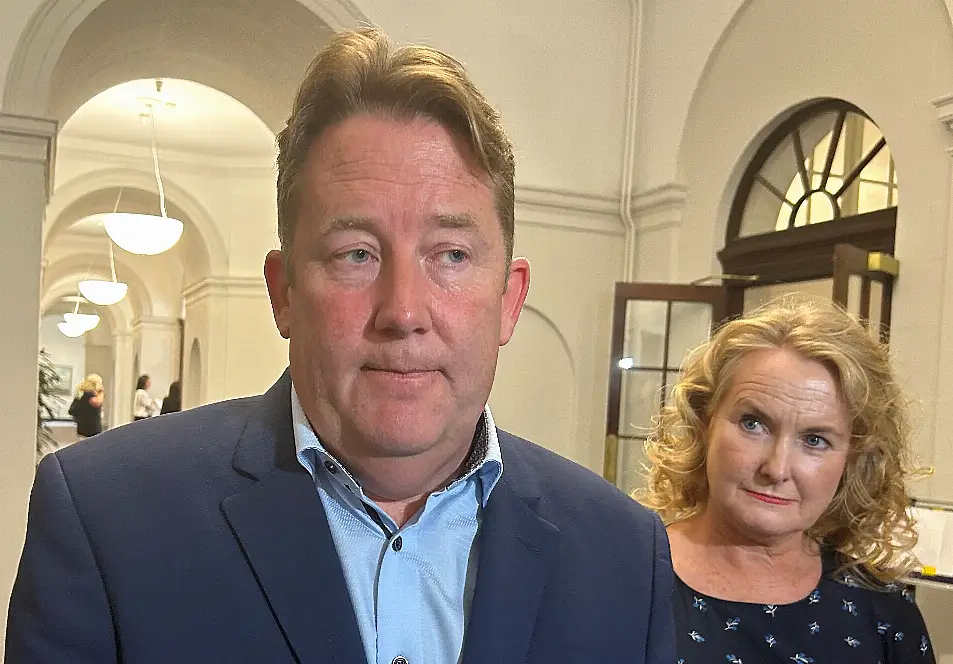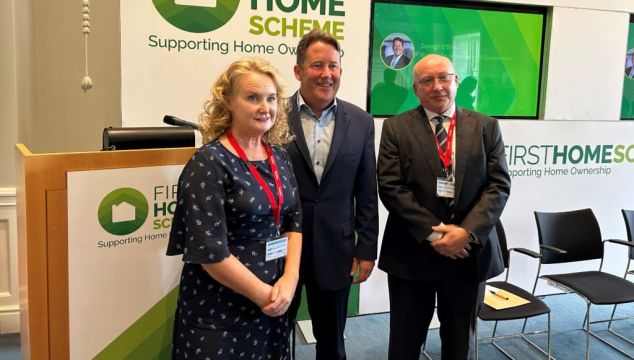The Minister for Housing has rejected the assertion that the Government’s shared-equity programme for first-time buyers is inflationary, as the First Home Scheme (FHS) announced it had provided approximately 500 facilities since it launched last year.
The FHS is an affordable housing scheme designed to support people buying new homes.
The shared-equity scheme involves the State and participating banks paying up to 30 per cent of the cost of a new home in return for a stake in the property.
Speaking to reporters at an event marking the one-year anniversary of the scheme, Minister Darragh O’Brien said “there is no inflationary impact” of the FHS.
He said he could understand why there had been “wild” speculation on the inflationary impact when the scheme was launched, but added there was no evidence that had been borne out.
In order to qualify for the FHS, the purchase price of the property must fall within the property price ceiling for the local authority area, which is linked to local median prices.
Mr O’Brien said: “If anything, we’ve seen developments come back to meet the price limits, and we’ve actually seen changes where the development sector knows there are clients out there who are approved for the First Home Scheme, and we’ve actually seen prices come back in to meet that.”
FHS chief executive Michael Broderick concurred with the minister but said more analysis would be done.

“That’s something we’re keeping a very close eye on but based on 500 facilities issued out of all of the new homes being delivered each year, 30,000 last year, I cannot see that as having a material impact at this point in time.”
Mr Broderick said “there was a large amount of counties where the scheme was not working because the price ceilings were too low”.
He said the ceilings had been raised in every local authority bar one, but added that he would not “be afraid” to bring them down where necessary.
The Department of Housing regards the scheme as “extremely successful”.
Mr Broderick said the FHS is designed to encourage a supply-side response.
“Build it and they will come.”
He said there had been more than 5,000 registrations for the scheme to date.
By the end of the first year of the scheme on July 7th, a total of 2,755 couples applied, while 2,222 single people had registered for the scheme.
Approximately 45 per cent of applicants are aged between 25-34, while around 40 per cent are aged between 35-and 44.
Of the active approvals, 23 per cent were in Dublin, 22 per cent were in Kildare, 16 per cent were in Cork, 11 per cent were in Meath, 8 per cent were in Wicklow and the remaining 20 per cent were spread across 19 counties.
Mr Broderick said 1,983 people had been given approval for the “life-changing” scheme, which equated to a funding reserve of 132 million euro.
Of the 474 drawdowns by July 7th, 448 were houses and 26 were apartments.
The average support received by each buyer was €68,000, with recipients receiving an average of 18 per cent of the property price.
Given that the maximum that someone can borrow is 30 per cent of the price of the property or 20 per cent if they are also receiving the help-to-buy scheme, Mr Broderick said this mean that buyers were “almost using the scheme to the max”.
Buyers can also avail of the scheme on a “fresh-start principle” if they are divorced or separated or have undergone a personal insolvency, bankruptcy arrangement or other legal processes and no longer retain an interest in the family home.
Approval has been given in 20 such instances.
Mr Broderick said he wanted to dispel two myths about the scheme which had arisen in “social media hysteria”.
He said it was “clearly not another mortgage” and that the Government would not be inspecting recipients homes.
Banking and Payments Federation Ireland chief executive Brian Hayes said the industry was “absolutely committed” to the scheme with €200 million in equity.
He said the industry was now seeing that first-time buyers were accounting for 67 per cent of all mortgage approvals.
At the event at the Customs House in Dublin, Mr O’Brien said he would not rule out expanding assistance to include potential buyers of second-hand homes.
However, he said the main focus of the scheme at present is driving supply of housing.

The minister, who said he recently helped his niece apply for the scheme, said he would keep the matter under review and wanted to see work being completed on expanding the scheme for self builds, which he characterised as “more complex”.
Mr O’Brien also told reporters he was not seeking a VAT reduction for the construction industry and added he was in favour of more targeted interventions such as the FHS and the development levy waiver.
“I’m not looking for a reduction in VAT for construction.”







